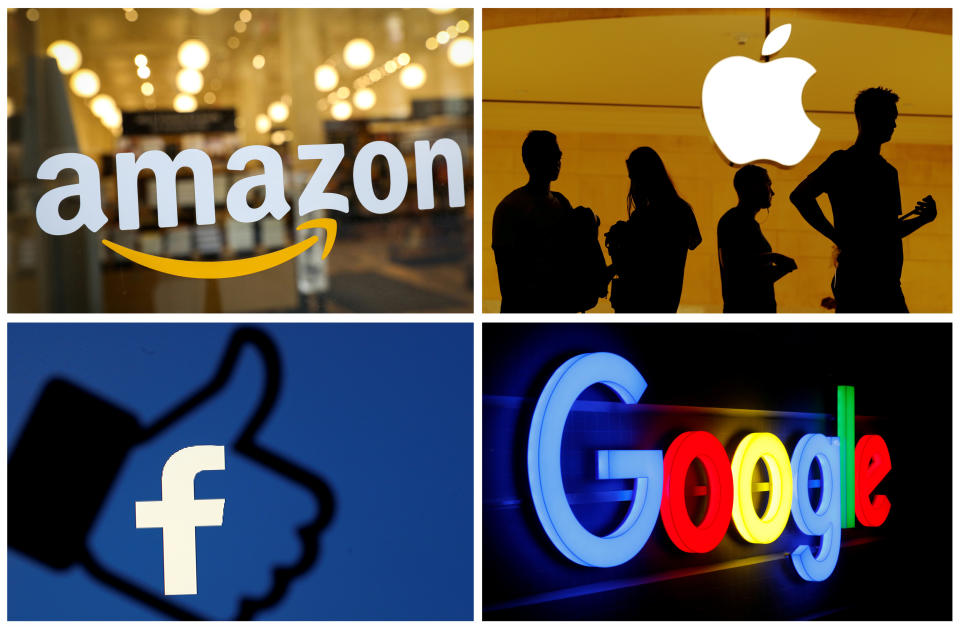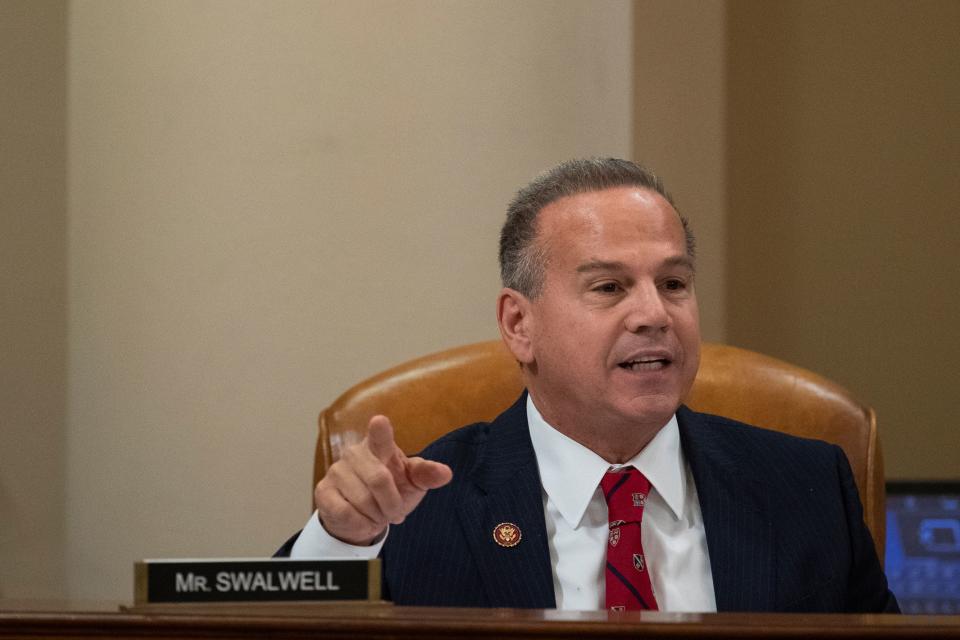How lawmakers, regulators could take on big tech in 2020
Big tech took a beating from politicians, regulators, the media and consumer advocates in 2019. Despite all the rhetoric around “taking on big tech,” Congress hasn’t passed meaningful legislation to regulate the industry.
It was a long year, so here’s a quick refresher on some of the highlights: Presidential candidate Sen. Elizabeth Warren (D-MA) made breaking up big tech companies a focal point of her campaign. Nearly every state attorney general in the U.S. announced an antitrust investigation into Google and a separate investigation into Facebook. The Federal Trade Commission slapped Facebook with a $5 billion fine. The FTC, the House Judiciary Committee and Department of Justice Department all started looking into big tech companies. Facebook ignited a firestorm after announcing its plans to enter the cryptocurrency arena and faced massive backlash over its political ad policy. There were data breaches and privacy scandals and secret White House meetings.
Companies like Facebook (FB), Amazon (AMZN) and Google (GOOG) were publicly shamed by lawmakers throughout the year, but the industry hasn’t faced too many consequences — yet.
Sen. Josh Hawley (R-MO), who has become an outspoken critic of big tech during his first year in Congress, told Yahoo Finance the conversation shifted in 2019.
“One of the things that we've been able to do this year is build a bipartisan coalition on pretty fundamental changes confronting big tech,” said Hawley.
Sen. Mark Warner (D-VA), another vocal advocate for tech regulation, noticed that change too — even among industry leaders. Next year, Warner and Hawley hope the change in conversation could lead to action.
“I think that there's a greater understanding that big tech cannot continue to be in this kind of wild, wild West area where there's no limits, there's no controls,” Warner said. “I actually think even big tech CEOs realize that their ability to push off national regulation may end up coming back and biting them in the end.”
Data privacy
One of the first issues Congress could tackle in 2020 is data privacy. As other countries develop privacy laws and California’s law goes into effect, U.S. lawmakers are feeling the pressure to get a federal law on the books.
Toward the end of 2019, top lawmakers on the Senate Commerce Committee put ideas on paper and held a hearing on data privacy. Lawmakers and industry experts are optimistic something will get done in 2020, though some warn it could be a series of smaller bills instead of one comprehensive piece of legislation.
“I hope we'll be able to get something across the finish line, you know, before we get too deep into...election season,” said Michael Bloom with the Internet Association.
You can read more about the prospects of a data privacy law this year here.

Break them up?
Don’t expect the tech giants to be broken up in 2020 or anytime soon – even if Warren wins the presidential election. If regulators do think a breakup is in order, it’s sure to be a messy legal battle that could take years.
“I think that everybody wants to do something fast, but you have to think carefully about all the implications of that,” said Maureen Ohlhausen, a former FTC commissioner and former Acting FTC Chair. “You have to... show that this remedy, this breakup that you want, addresses those antitrust violations that were proven. And I think that's the real challenge. I mean, breakup isn't just a punishment for a company you don’t like.”
Warner told Yahoo Finance he’s not advocating for a breakup yet, but said it could eventually be a possibility.
“I think there's actually a halfway decent chance,” said Warner. “Right now, if a new competitor came in against Facebook or against Google or against some of these platforms, it's a really enormous challenge for a new competitor to get enough momentum to truly be competitive.”
Warner said he’d rather see Congress pass legislation to allow data portability, to put a price on consumers’ data and give consumers the right to know whether they’re talking to a human or a robot.
“I think these pro-competition activities would be one way to, frankly, diminish the immediate move towards breakup. But let me be clear: If we don't find ways to bring these pro-competition efforts to the table, then we're going to have to consider other alternatives,” said Warner.
Hawley, who unsuccessfully asked Zuckerberg to voluntarily spin off Instagram and WhatsApp, said breaking up some companies should be on the table.
“You can make a strong case that Facebook, that Google have gotten too big. I do not think, for instance, Google should be allowed to acquire Fitbit now while they're under an antitrust investigation,” said Hawley. “Certainly spinning off companies is a remedy that I think we need to look at.”
Modernizing antitrust law
After months of investigation, the House Judiciary Committee’s antitrust panel is expected to complete its big tech investigation and release its recommendations this year. The committee held a series of hearings and collected thousands of documents from tech companies in 2019.
“We want to modernize our antitrust statutes, make sure they’re working right. We want to make sure that there are regulations in place that make sense, that promote competition. Then we want to make sure the agencies that are responsible for the antitrust enforcement are properly resourced. So they have the resources they need to do the work,” Rep. David Cicilline (D-RI), who leads the antitrust panel, said in a Yahoo Finance interview last year.

Hawley wants to see changes at the enforcement agencies tasked with antitrust concerns — the DOJ and FTC. In recent months, the agencies have bickered about big tech oversight.
“I think we've got to think about what do we do structurally about the problems we have between DOJ and the FTC? There's a lot of overlap between those agencies. They do not work together very well. They have spent a lot of time fighting with each other about who has jurisdiction and who not. I think we probably should do something about,” said Hawley.
While most of this debate is focused on a handful of companies, Ohlhausen said lawmakers should look at the big picture when considering changes to antitrust law.
“They [antitrust changes] would have very widespread implications, very widespread impact across the economy,” she said.
Some critics may want to prevent companies like Amazon or Apple from selling their own products on their own marketplace, but Ohlhausen questions how that change would impact brick and mortar stores.
“Platforms are ubiquitous. Lots of retailers, traditional retailers sell competing products and offer their own. Think about generic brands in stores or store brands at the grocery store,” said Ohlhausen. “That’s one of the things that would need to be examined and really dealt with.”
Misinformation, deepfakes and political ads
As the 2020 election approaches, stopping the spread of misinformation online, especially on Facebook, will be a priority.
Last year, lawmakers grilled CEO Mark Zuckerberg about Facebook’s controversial policy allowing politicians to lie in political ads, but he didn’t back down. In the midst of the outrage around Facebook’s policy, Twitter announced it was banning all political ads.
When asked if Congress would take any action on that issue, Warner said he’d rather see Zuckerberg voluntarily change the policy he calls a “huge mistake.”
“My fear with the Facebook policy is that if you have candidates putting out absolute, provable lies in their ads, and then you have potential of bad actors and even foreign bad actors with bots and trolls pushing that fake ad, the ability it has to disrupt our political system becomes very, very high,” said Warner. “I candidly think Facebook's decision is irresponsible.”
Warner, the top Democrat on the Senate Intelligence Committee, said the U.S. government and social media platforms were “totally caught off guard by the Russian efforts” to meddle in the 2016 election. Now, he says, the platforms and law enforcement are more aware, but the problem hasn’t gone away.
“In 2018, we did a better job of preventing that activity, but the truth is, Russia will be back. They've never stopped. China is starting to use these tools, increasingly, we've even seen beginnings of the misinformation tools used from Iran,” said Warner.

One of the emerging tools that could be used to spread misinformation is deepfakes, or manipulated videos. Experts have warned that someone could post a doctored video that appears to show a politician doing something inappropriate in order to discredit them. Warner is sounding the alarm about the problems this technology could cause.
“People will look like me and sound like me, or look like you and sound like you — but it's not you at all,” said Warner. “For many of us, seeing is still believing.”
Lawmakers have introduced legislation to combat deepfakes and the House Intelligence Committee held a hearing examining the issue last year. The Internet Association told Yahoo Finance the looming election is driving interest in deepfakes on Capitol Hill.
“I expect that we'll spend a fair amount of time looking to help educate lawmakers and their staffs on what to focus on with respect to this issue, what the risks are, what companies are doing about it,” said Bloom of the Internet Association.
While deepfakes could cause chaos in the political world, Warner cautioned bad actors could use deepfakes to roil the financial markets, too.
“If you see an image come across to your television or across your screen that looks like it's Jay Powell, the head of the Federal Reserve, and he's saying he's going to lower interest rates by X amount, and that's not really Jay Powell – the effect that could have in the markets through a deepfake manipulation is, again, one more reason why we can't continue to have this wild, wild West,” Warner said.
Jessica Smith is a reporter for Yahoo Finance based in Washington, D.C. Follow her on Twitter at @JessicaASmith8.
Read more:
Lawmakers want to penalize companies for ‘outrageous’ CEO pay
President Trump's auto tariff decision due in days
GOP congressman: Americans, lawmakers are 'waking up' to China threat
Rep. McHenry: Libra is 'strongly likely' to happen
Did Zuckerberg reassure Maxine Waters about Libra? 'Absolutely not.'
Lawmakers grill Facebook CEO Mark Zuckerberg on Libra
Follow Yahoo Finance on Twitter, Facebook, Instagram, Flipboard, LinkedIn, YouTube, and reddit.
